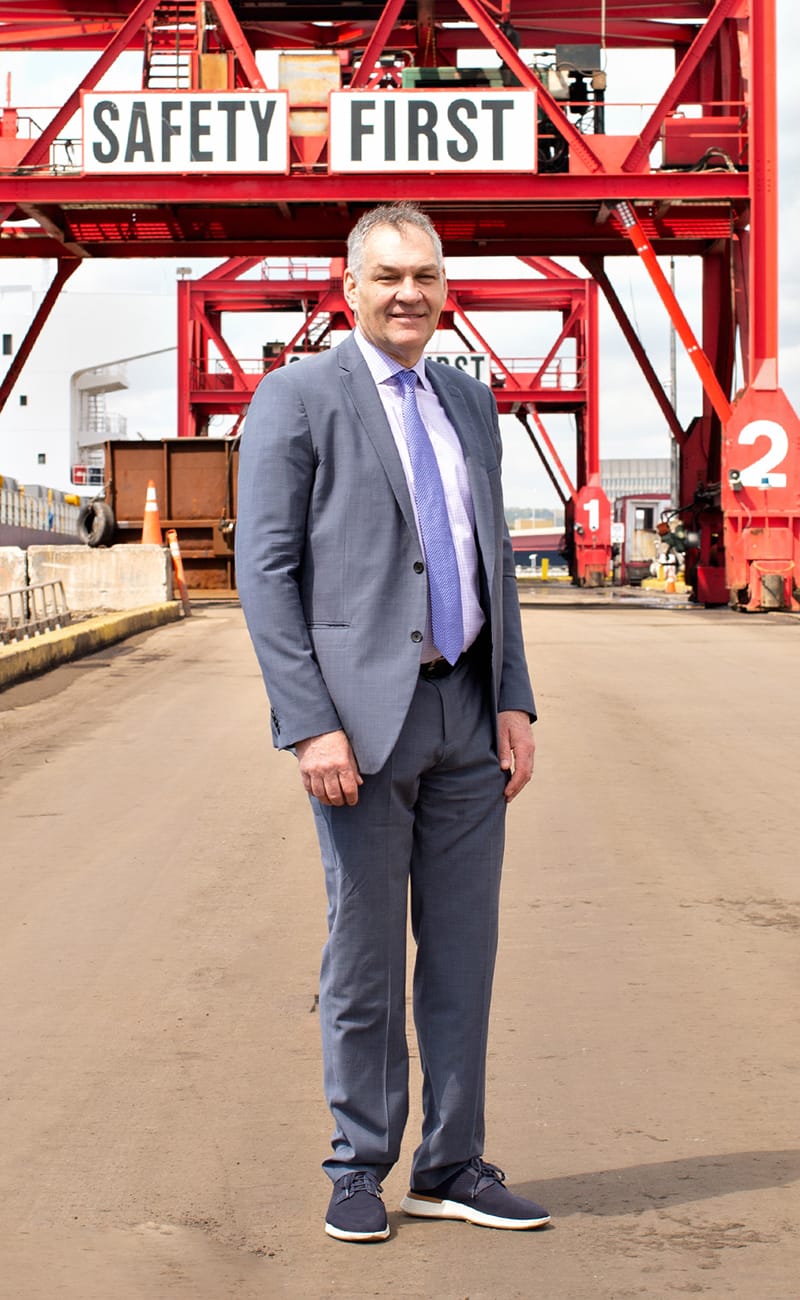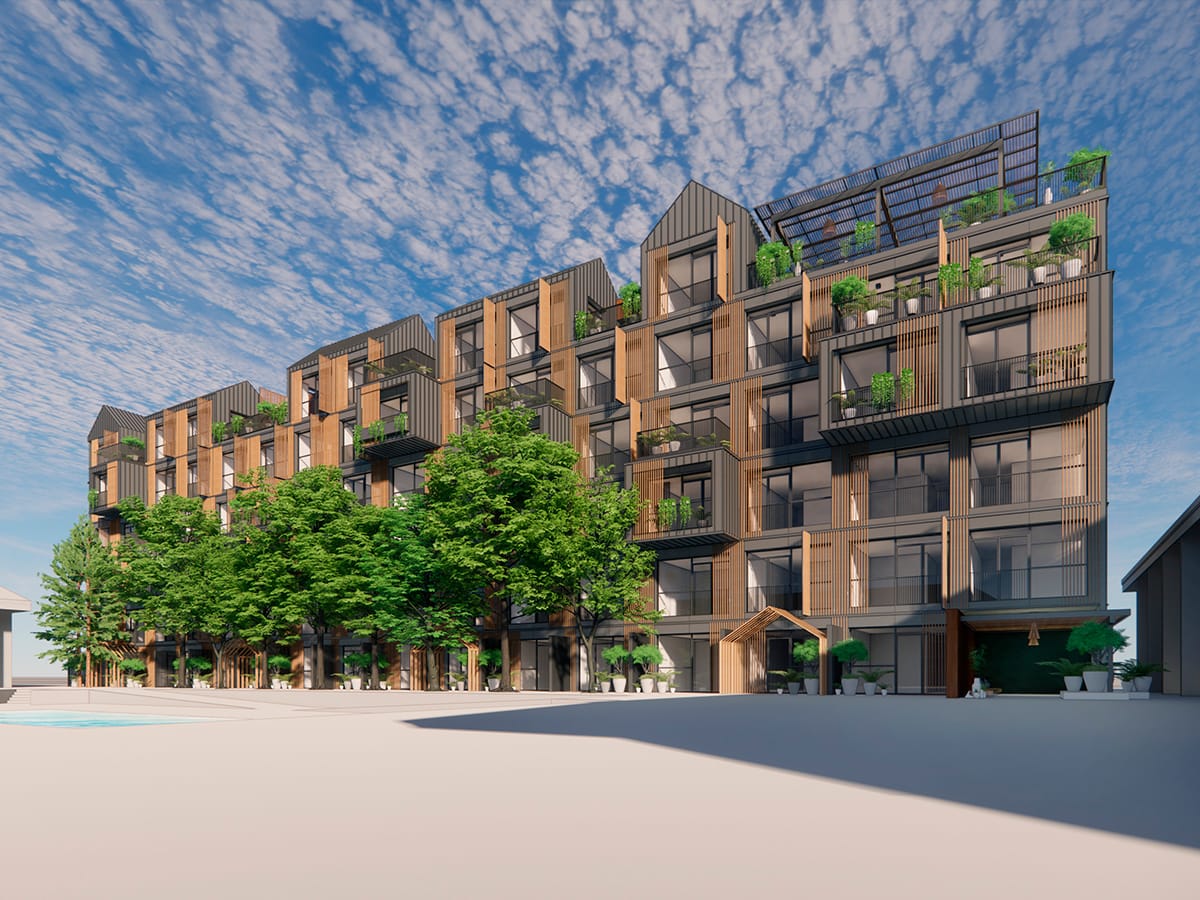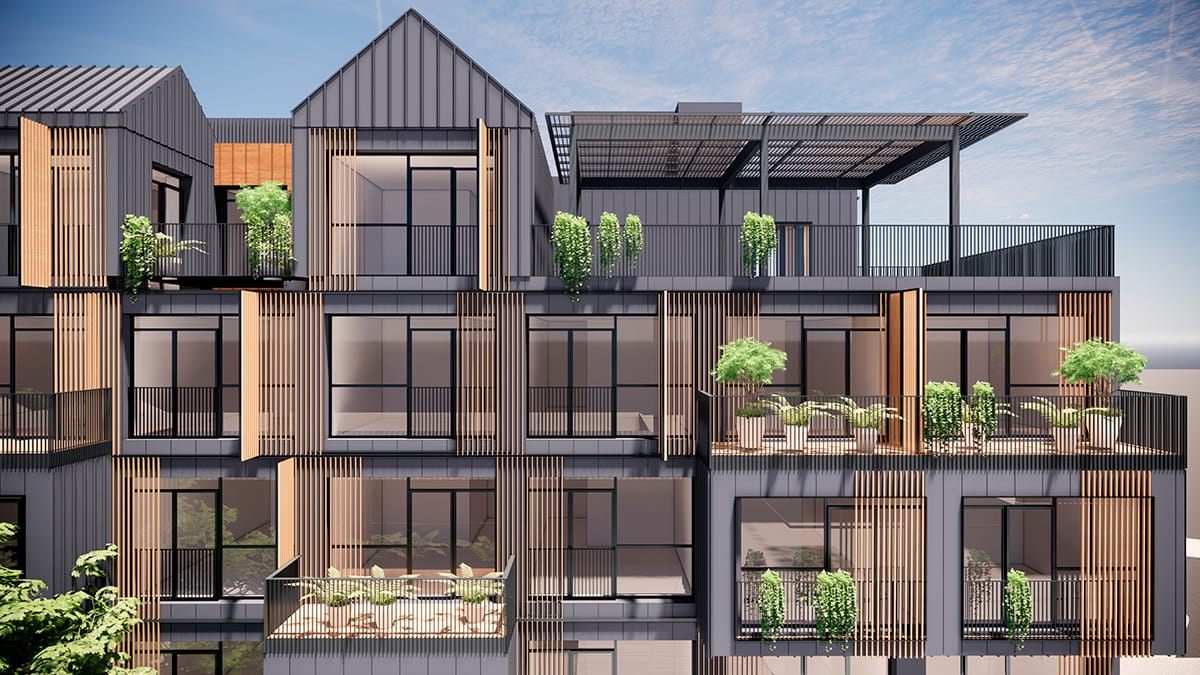FullStack Modular’s Bicoastal Moves Are Making Waves
A New HQ in CT and a Project With Starwood Capital in CA
As Founder and President of FullStack Modular, Roger Krulak has overseen the company’s growth since its inception in 2016. The firm has moved from its first factory in the Brooklyn Navy Yard to a new home in Hamden, Connecticut—all while establishing a flourishing factory in Portland, Oregon.
FullStack Modular has been in Connecticut since late April 2023, getting set up portside at Gateway Terminal. The company has been quick to establish contracts with the state government, providing design and manufacturing options for affordable housing and a myriad of other projects.
“Connecticut is very pro-development and have been great partners since our arrival in Hamden,” said Roger. “The business environment there is very proactive in encouraging new ways to meet their housing needs. So that’s super exciting, and our participation in that is growing.”
In Portland, FullStack Modular is collaborating with the city’s public transportation agency, TriMet, in an effort to develop housing near its rail lines. Roger says it’s all part of his bigger vision to optimize and improve the construction process to propel the industry forward.
“Manufacturing is a process of continuous improvement. The first time we build something, it’s never as efficient as the fifth time we build it. Industrialized construction embraces this approach and we are happy to see that the built environment is finally open to utilizing industrialization and offsite construction to help solve for what seems like an unrelenting demand,” he said.
“Is there a better way to do this? Over the years, I have become very fond of that mindset and process. And I think that the industry as a whole is finally starting to embrace change in order to move the industry forward.”
All the changes and expansions to the business have given Roger a better understanding of the value of continuous improvement, especially as factories adopt robots and automation to increase their speed and efficiency.
Know Your Process Before Introducing Automation
Having been in the business for over 15 years, Roger has seen a lot of successes and failures in the industry. These days, he says, anyone looking to expand or work in modular manufacturing needs to focus on owning their design and process before introducing automation.

Roger Krulak, founder and president of FullStack Modular. Photo credit: Riverstone Images Studio.
“First, know what your product is and know how you’re going to build it effectively,” he says. “Second, make sure that your factory can accommodate the needs of your product and your process.”
Roger notes that automation—without knowing your process inside and out—could lead to larger financial mistakes down the line. While mistakes are unavoidable, there are some costly ones that manufacturers can and should be wary of.
“I see that mistake made literally every day of the week. They buy a bunch of robots, and they build a window plant that can make 8,000 windows a week, but you can’t even use 8,000 windows in three months,” he says. “Nothing’s going to be perfect, and continuous improvement is imperative. One thing I’ve heard too many times is, ‘I’m buying a bunch of robots, and then I’m going to figure out how to use them.’ Do not do that!”
With these experiences and lessons learned, FullStack Modular’s dedication to sustainability and process yielded their latest project for the Portland factory: a sustainable hotel for Starwood Capital Group in Sunnyvale, California.

A rendering of Starwood Capital Group's first modular Treehouse hotel in Sunnyvale, CA, manufactured by FullStack Modular. Opening is scheduled for late 2024.
Related Listening:
Notes From a Growing Manufacturer: New Projects and Lessons Learned w/ FullStack Modular
Roger Krulak, founder of FullStack Modular, joins the podcast to talk about the growth of his modular manufacturing company and the exciting projects FullStack and its partners have in the pipeline.
Roger also shares some of the lessons learned from his career in modular and gives advice to up and coming modular manufacturers.
Chasing Sustainability Highs in California
The six-story Treehouse hotel features 200 modules and 143 rooms, all done in coordination with Starwood Capital Group, who, as Roger says, has embraced many of the tenets that make modular work better. The private investment company was looking for a firm that could build in California not just with sustainability in mind, but also climate resiliency in a high seismic zone.
In fact, FullStack Modular’s focus as a mid-to-high-rise all-steel construction modular company resonated with Starwood Capital Group’s plans to create the first Treehouse hotel in the U.S.
“They interviewed every modular company in the world,” said Roger. “It sounds funny, but I’m totally serious. They felt like our unique approach to offsite construction provided them a long-term solution.”
“Our system is seismically responsive, wind responsive, and adaptable to almost every condition,” said Roger. “From whatever our mods sit on all the way through the parapet, it’s all mods, stairwells, elevator shafts, [and] there are no concrete cores in FullStack Modular’s system. It’s all steel and cement floors. Then, it’s all bolted together on-site.”

Manufacturing Modules in Portland Bound for California
After working with Starwood Capital Group on the overall design and goal, the Portland factory set to work on developing six different varieties of modules. With FullStack Modular’s system of building with double-loaded corridors, the construction and building process looks to be quick. Roger says the company is aiming to assemble the six-story building over the course of one month once all the modules have arrived via truck from Portland to Sunnyvale.
While the Portland factory is working on these modules, the project took a bit to get started. COVID delays related to the hotel business—namely financing and knowing when to officially start—plagued the manufacturer, on top of supply chain delays.
In all, the timeline is now set to deliver the modules in April or May of 2024. The goal is to have the hotel open by the end of 2024.
About the Author: Karen P. Rivera is a freelance writer and editor with a passion for storytelling. She is a former United Nations-based reporter, with experience covering international breaking news, venture capital, emerging healthcare tech, and the video game industry.
More from Modular Advantage
AI, Faster Sets, and Automation: The Future of Modular is at World of Modular
While the modular building industry has long known that it can be an effective solution to increase affordable housing, the word is slowly spreading to more mainstream audiences. Three presentations at this year’s World of Modular in Las Vegas hope to provide insight and direction for those seeking a real solution to the crisis.
An Insider’s Guide to the 2025 World of Modular
The Modular Building Institute is bringing its global World of Modular (WOM) event back to Las Vegas, and with it comes some of the industry’s best opportunities for networking, business development, and education. Over the course of the conference’s four days, there will be numerous opportunities for attendees to connect, learn, and leverage event resources to get the most out of the conference.
Affordable Housing Now: The Industry’s Best Bring New Solutions to World of Modular
While the modular building industry has long known that it can be an effective solution to increase affordable housing, the word is slowly spreading to more mainstream audiences. Three presentations at this year’s World of Modular in Las Vegas hope to provide insight and direction for those seeking a real solution to the crisis.
Opportunities for Innovation in Modular Offsite Construction
Modular Offsite Construction has already shattered the myth that it only produces uninspired, box-like designs. Architectural innovations in module geometry, configurations, materials, and products make it possible to create visually stunning buildings without sacrificing functionality or efficiency.
Safe Modular Construction with Aerofilm Air Caster Transport
In collaboration with Aerofilm Systems, Heijmans developed innovative skids using air caster technology for moving modules easily and safely. These pallets are equipped with an auto-flow system, making operation extremely simple.
Miles, Modules, and Memes: Building a Modular Network One Flight at a Time
At the end of the day, social media is just another tool for building connections, and like any other tool, needs to be used skillfully to work properly. Use social media thoughtfully, and it will open doors to real opportunities and relationships you didn’t even see coming.
Falcon Structures: Thinking Inside the Box
Some of Falcon’s latest projects include creating container solutions for New York’s Central Park and an East Coast professional baseball team. More and more, Falcon is shipping out container bathrooms and locker rooms to improve traditionally difficult work environments, like those in oil and gas or construction.
UrbanBloc—From Passion to Industry Leader
UrbanBloc specializes in three main categories or markets – what they call “Phase 0” projects, amenities, and urban infill. Clients are often attracted to shipping containers because from a real estate perspective they are considered an asset. Having the flexibility to move and transport these assets allows owners to respond to different circumstances in a fluid manner that they can’t get with standard construction.
The Hospitality Game-Changer
“Hospitality is about more than just providing a service – it’s about delivering an experience,” says Anthony Halsch, CEO of ROXBOX. “And that’s where containers thrive. They allow us to create spaces that are unique, efficient, and sustainable.”
Container Conversions Counts on Simplicity to Provide Critical Solutions
Container Conversions has fabricated and developed thousands of containers for varied projects, including rental refrigeration options, offices, kitchens, temporary workplace housing, and mobile health clinics.










